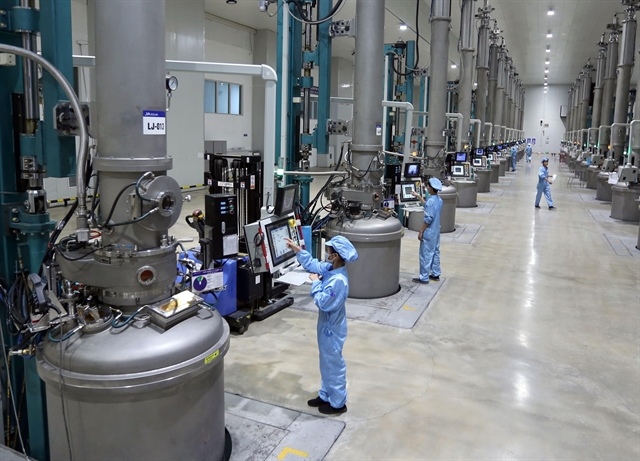 Economy
Economy

 |
| Solar batteries are made at Hong Kong-invested JA Solar Vietnam Co in Quang Châu Industrial Park. The country is anticipating major high-tech and future technology projects in 2024. — VNA/VNS Photo Danh Lam |
HÀ NỘI — Việt Nam expects to attract major high-tech and future technology projects in 2024, as many foreign big names in this field have shown interest in the country.
Late last month, China’s Hainan Drinda New Energy Technology Co signed a memorandum of understanding on investing in a solar panel factory in the central province of Nghệ An, truyenhinhnghean.vn reported.
Located in Hoàng Mai II Industrial Park, the 58-ha factory has a total investment capital of US$450 million. It will have a designed production capacity of 14 GW, according to the online newspaper.
Vice chairman of the provincial People's Committee Bùi Thanh An said that the factory would contribute to the renewable energy transition, helping the country realise its goal of reducing greenhouse gas emissions to achieve net zero emissions by 2050.
Meanwhile, Lam Research, one of the leading US semiconductor manufacturing equipment providers, said it looked to expand operations and diversify its supply chain in Asia.
In Việt Nam, the company planned to collaborate with Seojin, which already had factories in northern Bắc Ninh and Bắc Giang provinces, to develop factories and establish a supply chain with an investment of $1-2 billion in the first phase, Karthik Rammohan, Group Vice President of Global Operations at Lam Research said.
After the first phase, the firm would possibly invest directly or expand its operations in the Southeast Asian country, he said during a meeting with Prime Minister Phạm Minh Chính late last month.
Similarly, a joint venture between China’s Huadian Corporation and Việt Nam’s Minh Quang company has announced its plan to invest in a super project to produce green hydrogen in the central province of Quảng Trị, with a total capital of around $2.4 billion, the province reported.
According to president of Việt Nam’s Association of Foreign-Invested Enterprises, Nguyễn Mại, despite the country's desire to attract investment in advanced, new, and future technology projects such as semiconductor, artificial intelligence (AI) and green hydrogen, the biggest obstacle was that it did not have adequate institutions, policies and mechanisms.
The investment environment and administrative procedure issues still had many problems, baodautu.vn cited the chairman as saying.
To attract more investment, he proposed giving priority to perfect institutions and laws, improving internal strength, modernising socio-economic infrastructure and speeding up administrative reform.
During the Vietnam Global Manufacturing Forum 2024 held last month in Hà Nội, Deputy Minister of Planning and Investment Trần Duy Đông said Việt Nam had prepared the necessary conditions to attract “eagles” worldwide in the electronics and semiconductor industry.
The Vietnamese Government and Prime Minister were directing the Ministry of Planning and Investment (MPI), relevant ministries, and agencies to prepare the best conditions to welcome incoming investments, he said.
Statistics from the Foreign Investment Agency revealed that Việt Nam attracted $6.17 billion worth of foreign investment in the first quarter of 2024, a year-on-year rise of 13.4 per cent.
Specifically, in the period, 644 new projects with a total registered capital of $4.77 billion were granted licences, up 23.4 per cent in the number of projects, and 58 per cent in value year-on-year.
A total of $934.6 million was registered to be added to 248 existing projects and $466.2 million was earmarked for stake purchase and capital contribution.
During the period, the foreign investment disbursement rose 7.1 per cent to $4.63 billion, a signal that the disbursement would continue the positive trend, the agency said. — VNS




